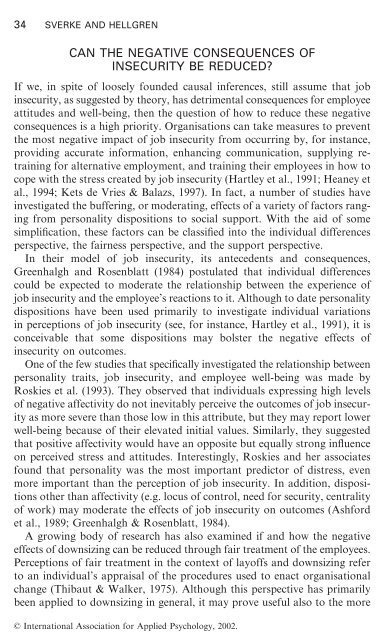The Nature of Job Insecurity - Psicologia del Disagio Lavorativo ...
The Nature of Job Insecurity - Psicologia del Disagio Lavorativo ...
The Nature of Job Insecurity - Psicologia del Disagio Lavorativo ...
You also want an ePaper? Increase the reach of your titles
YUMPU automatically turns print PDFs into web optimized ePapers that Google loves.
34 SVERKE AND HELLGREN<br />
CAN THE NEGATIVE CONSEQUENCES OF<br />
INSECURITY BE REDUCED?<br />
If we, in spite <strong>of</strong> loosely founded causal inferences, still assume that job<br />
insecurity, as suggested by theory, has detrimental consequences for employee<br />
attitudes and well-being, then the question <strong>of</strong> how to reduce these negative<br />
consequences is a high priority. Organisations can take measures to prevent<br />
the most negative impact <strong>of</strong> job insecurity from occurring by, for instance,<br />
providing accurate information, enhancing communication, supplying retraining<br />
for alternative employment, and training their employees in how to<br />
cope with the stress created by job insecurity (Hartley et al., 1991; Heaney et<br />
al., 1994; Kets de Vries & Balazs, 1997). In fact, a number <strong>of</strong> studies have<br />
investigated the buffering, or moderating, effects <strong>of</strong> a variety <strong>of</strong> factors ranging<br />
from personality dispositions to social support. With the aid <strong>of</strong> some<br />
simplification, these factors can be classified into the individual differences<br />
perspective, the fairness perspective, and the support perspective.<br />
In their mo<strong>del</strong> <strong>of</strong> job insecurity, its antecedents and consequences,<br />
Greenhalgh and Rosenblatt (1984) postulated that individual differences<br />
could be expected to moderate the relationship between the experience <strong>of</strong><br />
job insecurity and the employee’s reactions to it. Although to date personality<br />
dispositions have been used primarily to investigate individual variations<br />
in perceptions <strong>of</strong> job insecurity (see, for instance, Hartley et al., 1991), it is<br />
conceivable that some dispositions may bolster the negative effects <strong>of</strong><br />
insecurity on outcomes.<br />
One <strong>of</strong> the few studies that specifically investigated the relationship between<br />
personality traits, job insecurity, and employee well-being was made by<br />
Roskies et al. (1993). <strong>The</strong>y observed that individuals expressing high levels<br />
<strong>of</strong> negative affectivity do not inevitably perceive the outcomes <strong>of</strong> job insecurity<br />
as more severe than those low in this attribute, but they may report lower<br />
well-being because <strong>of</strong> their elevated initial values. Similarly, they suggested<br />
that positive affectivity would have an opposite but equally strong influence<br />
on perceived stress and attitudes. Interestingly, Roskies and her associates<br />
found that personality was the most important predictor <strong>of</strong> distress, even<br />
more important than the perception <strong>of</strong> job insecurity. In addition, dispositions<br />
other than affectivity (e.g. locus <strong>of</strong> control, need for security, centrality<br />
<strong>of</strong> work) may moderate the effects <strong>of</strong> job insecurity on outcomes (Ashford<br />
et al., 1989; Greenhalgh & Rosenblatt, 1984).<br />
A growing body <strong>of</strong> research has also examined if and how the negative<br />
effects <strong>of</strong> downsizing can be reduced through fair treatment <strong>of</strong> the employees.<br />
Perceptions <strong>of</strong> fair treatment in the context <strong>of</strong> lay<strong>of</strong>fs and downsizing refer<br />
to an individual’s appraisal <strong>of</strong> the procedures used to enact organisational<br />
change (Thibaut & Walker, 1975). Although this perspective has primarily<br />
been applied to downsizing in general, it may prove useful also to the more<br />
© International Association for Applied Psychology, 2002.


